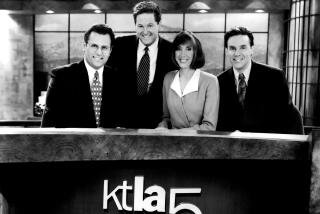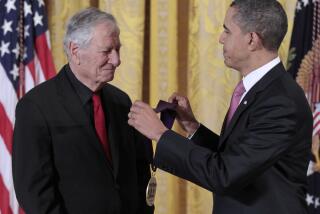Jerry Rubinstein Has Drawn Static in a Varied Business Career. Now, With a Cable Music System, He’s Hoping for a : Clear Channel to Profits
- Share via
Like his high-profile record career, Jerry Rubinstein’s business ventures have amounted to an endless search for hits.
United Artists records was one early chart topper. Rubinstein and his partners bought and sold the company for a tidy profit in the 1970s. Then there was Bel-Air Savings, a small thrift he and some major Hollywood players sold with what, in hindsight, was perfect timing in 1987, just before the S&L; industry unraveled.
But with the hits have come some misses.
There was an unsuccessful attempt to turn around American Broadcasting Co.’s money-losing record operations in the mid-1970s. A horse breeding business pulled up lame. And an oil and gas operation launched in the early 1980s ran head-on into the collapse of oil prices. Some investors later alleged in court that they were promised spectacular returns that never materialized.
Now the 54-year-old Rubinstein is searching for another hit in the form of fledging International Cablecasting Technologies and its Digital Music Express, or DMX, a premium-music service delivered to homes and businesses via cable TV lines.
With ICT, Rubinstein is making a big bet that some aren’t sure will pay off: that people will pay from $9 to $13 a month on top of their current cable bills for 30 channels of commercial-free, compact disc-quality music.
If nothing else, the bet is paying off for Rubinstein: Even though the company lost $26.4 million in its last fiscal year, he earned more than $2.5 million in compensation.
With a hand-held device, subscribers can call up Beethoven or Sinatra one moment, Guns N’ Roses or Ice Cube the next. Each channel plays a pre-programmed category of music--heavy metal, reggae, oldies, classical, jazz--using a signal bounced from an Atlanta programming center off a satellite to cable operators.
“I always thought that a pre-programmed service for the home was a great item,” Rubinstein said. A second part of his plan is to persuade businesses to pay up to $75 a month to replace services such as Muzak.
Heavily promoted over the last year--critics say a little too hyped--the service has been touted by some as the “Home Box Office of radio” and the fastest-growing segment of the cable business. Rubinstein has attracted big-time investors: Denver-based cable TV giant Tele-Communications Inc., cable TV equipment maker Scientific-Atlanta, and individuals ranging from film and music star Barbra Streisand to the brother of international arms dealer Adnan Khashoggi.
Over the last five years, ICT has piled up losses totaling $45 million. Yet its stock seems to defy gravity. Despite the losses, the stock continues to hover around $6 a share in over-the-counter trading. That means the company, which had negligible revenue of $773,861 in its last fiscal year, has a total market value of nearly $200 million.
A fresh disappointment at the end of January did do some damage to ICT’s stock.
Two major players that Rubinstein had tried hard to recruit as investors--Sony and Time Warner--chose instead to invest in Rubinstein’s only rival, Digital Cable Radio in Hatboro, Pa. Cable operators have been choosing sides, and Time Warner--the nation’s second-biggest cable company--was the biggest uncommitted player.
The Sony-Time Warner investment is also considered significant because both firms’ music divisions are expected to use Rubinstein’s rival to promote their musical acts.
ICT’s stock lost 12% of its value last Monday, the day after the Sony-Time Warner announcement, but has recovered slightly. (Times Mirror Cable Television, a sister company to the Los Angeles Times, is a limited partner in Digital Cable Radio.)
Cable systems in the west San Fernando Valley and the South Bay offer DMX. Digital Cable Radio can be found in parts of Orange County.
Rubinstein acknowledges disappointment at losing Time Warner, because its cable systems would have added another 6.8 million potential customers. But he says the demands of Sony and Time Warner were too high.
As for the lofty stock price for his profitless company, Rubinstein says it reflects continued faith in what has turned out to be a lengthy start-up process--one that has required about $30 million in development money. Once cable operators get subscribers to listen to the music, he believes, more homes will sign up; more than 125,000 have subscribed so far.
Rubinstein also predicts that the big losses will end as the system is offered more widely; the first profitable month is expected soon. ICT pays royalties on the music it plays, just like radio stations, but it also receives about $30 a year for each subscriber its cable distributors sign up.
Despite the losses to date, Rubinstein is well compensated. His pay and stock compensation for the year ended Sept. 30 rival the packages given top Fortune 500 executives. Public documents list his cash compensation at $302,111. Directors also installed a deferred-compensation plan in which he is accruing cash at a rate of $200,000 a year.
But the biggest chunk of compensation comes from a stock bonus of 1.03 million shares, which Rubinstein is scheduled to acquire in chunks over three years, starting last fall. The documents show that the value of 342,507 shares he acquired at that time was more than $2 million.
“The combination of less than $1 million in revenue, a $26-million loss and more than $2 million in pay is like hitting 16 cherries in a row in the slot machine,” said Graef S. Crystal, one of the nation’s leading executive-compensation experts. “I’ve never heard of such a thing.”
Rubinstein says he initially worked for the company for no money at all, and even paid some expenses out of his own pocket. In addition, his early investment was diluted as other investors were brought in.
“This is more for things I have done than things I will do,” he said.
ICT documents also indicate that the company’s success depends significantly on Rubinstein. The company has taken out a $5-million “key man” life insurance policy to protect itself if Rubinstein dies.
For ICT’s other stockholders, the question is whether Rubinstein can line up enough cable subscribers to justify both the money sunk into DMX and his own compensation.
Audiophiles praise the quality of the new music service, while some radio executives see it as a clear threat, even though listeners cannot use cable music services in their cars, where people listen to the radio most.
“I think the competition for us is very, very serious,” said Wallace Smith, president of KUSC, a public radio outlet that offers classical music and public affairs programs. “Why on earth would anyone want to put up with the sound quality of radio when they have the chance to get direct CD sound anytime, with no interference or any of the noise that can get into the signal?”
Rubinstein also gets high marks for including a remote-control device that allows listeners to call up the name of the artist, song, album and catalogue number for the music to which they are listening. His rival, Digital Cable Radio, also offers a remote that identifies songs.
But quality sound and high-tech remotes may not be enough to attract a mass audience--especially with the economy sputtering toward recovery.
Cable operators already market premium services such as Home Box Office, Cinemax and Showtime to users who complain loudly about soaring bills. The cost of basic cable TV service--without any pay channels--has increased 46% since 1982 to an average of $19.38 a month last year, industry and government research shows. With pay channels, monthly bills can easily run from $35 to $45.
Broadcasting and cable operator Marty Pompadur, a friend of Rubinstein’s who worked with him at ABC, praises Rubinstein for helping develop the digital audio business. But Pompadur has doubts that cable operators can easily sell the service at a time when many subscribers are resisting higher bills.
“People are not going to sign up in mass numbers for another $10 a month,” he said. “That’s a lot of money.”
Marc B. Nathanson, who heads Los Angeles-based Falcon Cable Television, said he has yet to commit Falcon to a premium-music service because he is unimpressed by the number of subscribers signing up where the service is available.
And while he personally likes the format, Nathanson warns that cable music will work only if it is “very, very consumer-friendly. So far, DMX is the best in that direction, but it has a long way to go.”
Specifically, Nathanson dislikes the need to install yet another cable box in the home for music. And Pompadur notes that the cable industry as a whole is notoriously inept at marketing new services.
Rubinstein acknowledges that the service is not an easy sell.
“You can’t just tell people about it,” he said. “They have to hear it. They have to try the remote.”
Another potential problem is music industry opposition. Officials with the Recording Industry Assn. of America trade group say cable music could hurt sales because people will tape high-quality recordings. Rubinstein argues that it will instead promote sales--citing as proof the decision by Sony and Time Warner to get into the business.
Rubinstein, a graduate of UCLA and Loyola Law School, emerged in the early 1970s as a prominent entertainment business manager, with clients such as Neil Young and Joni Mitchell--as well as mogul-to-be David Geffen.
He moved to ABC in 1975 to turn around the company’s ailing record division--an experience Rubinstein describes as frustrating because the company was forced to take a large number of write-downs to clean up problems dating from before his tenure. Some former employees add that ABC Records was also short on hits under Rubinstein.
He moved into the energy field in 1982 with JRC Oil, a Colorado exploration firm formed during the oil boom of the late 1980s--a boom that quickly became an industrywide bust. At about the same time, Rubinstein was part of a group of investors in a money-losing Arabian horse operation in Colorado.
Rubinstein describes himself as essentially a passive investor in the horse venture, although documents filed with the Securities and Exchange Commission list him as chief executive for about two years and show that he had a part-time employment contract with a $48,000 annual salary.
In addition, the company paid Rubinstein and a business partner $2,000 a month for office space and $29,650 for using his plane. Company documents filed with the SEC show that about $470,000 of the proceeds from a public offering by the horse venture were deposited in Bel-Air Savings--which Rubinstein chaired at the time--or invested in its securities. Rubinstein severed his ties to the horse operation in late 1984.
Several major investors were unhappy with the oil and breeding operations, including onetime California Coastal Commissioner Mark L. Nathanson (no relation to Falcon Cable’s Marc Nathanson).
Mark Nathanson sued, alleging that his $160,000 investment in the horse venture and $133,000 in limited partnerships organized by JRC Oil were worth little or nothing. Nathanson, now under indictment for allegedly misusing his Coastal Commission seat, claimed in court papers that Rubinstein told him that the horse venture’s profits could run as high as 400%.
The Nathanson lawsuit was eventually settled quietly before a trial. The terms were not revealed. Rubinstein said he believes that he was sued because the investments did not perform well, through no fault of his.
Meanwhile, Rubinstein and a group that included such Hollywood notables as current Sony Pictures chief Peter Guber and Guber’s then-partner, Jon Peters, had invested in Bel-Air Savings. The thrift was sold at a profit to Topa Savings in 1987, just before an industry tailspin prompted a government crackdown on thrifts.
Rubinstein, who commutes from his home near Santa Barbara to International Cablecasting’s headquarters in West Los Angeles, says he discovered cable music in 1986 during a conversation with a fellow airline passenger, who told him about some friends who were exploring the idea. Rubinstein studied the venture, enlisting, among others, Atlanta radio consultant Kent Burkhart, now a director of the company.
“We spent a lot of time putting it together, testing to find out which formats would be the most popular and if the public would buy it,” Burkhart recalled. “Then we said, ‘Let’s go.’ ”
In 1989, Rubinstein hooked up with Denver-based Tele-Communications Inc., which, with about 22% of the U.S. cable market, is the country’s largest operator. A year later, he landed another major supporter, Viacom International, the nation’s 15th-largest cable operator. He also recruited W. Thomas Oliver, a former senior executive with Home Box Office, to develop the company.
Pompadur, the cable and broadcasting executive, says that despite his skepticism about cable music services, ICT could easily turn profitable because its highly automated programming is relatively inexpensive to operate.
But technological developments on the horizon leave ICT’s prospects open to debate. Rubinstein contends that the company can continue providing its music to homes and businesses regardless of the technology used.
But some industry executives believe that cable music services are too narrow a bet. They argue that new technologies, such as digital broadcasting and fiber-optics, are developing fast and could quickly displace current systems.
With that could come a host of new music programmers as well, they say.
A Mixed Record
Music industry executive Jerry Rubinstein has plunged into a range of industries over the last two decades, though rarely with the success he enjoyed in the recording business. Company: ABC Records Title: Chairman Years: 1975-77 Results: Unable to turn around chronically troubled operation. Later sold to MCA.
Company: United Artists Records Title: Co-owner, partner Years: 1978-79 Results: Aided by success of singer Kenny Rogers, sold company at a profit to EMI.
Company: Bel-Air Savings Title: Chairman, co-founder Years: 1982-87 Results: Sold at a profit to Topa Capital Corp.
Company: JRC Oil Title: Co-founder, partner Years: 1982-88 Results:
Suffered from price collapse and supply glut that plagued energy companies in mid- to late-’80s. Some investors claimed they were promised spectacular returns that never materialized.
Company: Desert Arabian Bloodstock Title: Chairman, CEO Years: 1982-84 Results: Bred Egyptian Arabian horses in Colorado and New Mexico. Consistently lost money. Later sold.
Company: International Cablecasting Technologies Title: Chairman, CEO Years: 1986-present Results: Has attracted big name partners, including Tele-Communications Inc. and Scientific Atlanta
Rubinstein’s Latest Venture
International Cablecasting Technologies of West Los Angeles offers Digital Music Express to cable television subscribers. The service sends commercial-free, compact disc-quality music over 30 pre-programmed channels into homes and offices.
Source: Company reports
More to Read
The biggest entertainment stories
Get our big stories about Hollywood, film, television, music, arts, culture and more right in your inbox as soon as they publish.
You may occasionally receive promotional content from the Los Angeles Times.











